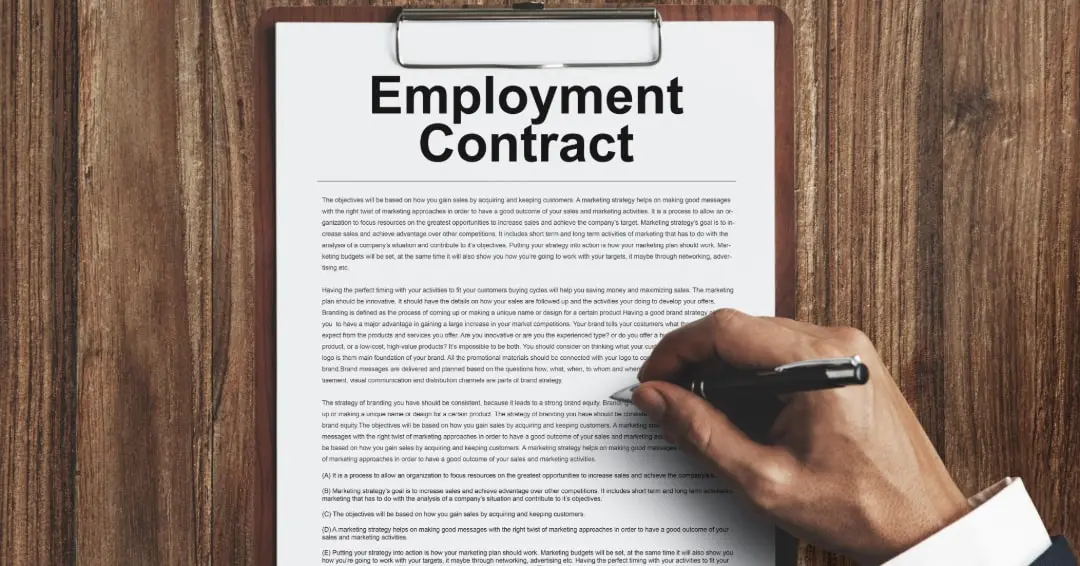UAE is recognized as a land of opportunity in the Middle East. Dynamism requires a legal framework. Adapts to changing employment landscapes. According to UAE Labor Law, the UAE has amended the UAE Labour Contract Changes.
We will delve deep into the details of these changes in this article. We will talk about aspects such as:
- Compliance deadlines
- Fixed-term contracts, and
- What is limited and unlimited contracts in UAE
The UAE designed these changes to strike a harmonious balance. A balance between safeguarding the employee’s rights and promoting business flexibility.
UAE Labour Contracts Latest Updates:
The UAE employment is undergoing a significant transformation. This is so with the implementation of UAE labour law 2024. It encompasses various facets of employment. This includes UAE labour contracts which are fundamental. Especially to define the employment terms in this dynamic region.
In the UAE, among the key transformations are alterations to limited contracts and fixed-term contracts. It is necessary to understand the nuances of these contract types. As they dictate the duration and conditions of employment. Furthermore, it comprehends the implications of the new labour law in UAE 2024. It is essential to understand for both employers and employees.
As we delve deeper into this guide, you will gain insights into the specifics of limited contract UAE 2024 and the considerations surrounding resignations within this framework. We will also explore the question of “what is Labour contract in UAE?” within the updated regulations in the UAE for the year 2024.
New UAE Labour Contract Regulations Deadline
For the year 2024, the implementation of the UAE labour law has ushered in substantial alterations. This exerts a profound influence on UAE labour contracts. Also, the way employment relationships are structured in the region. These changes come with a specified timeframe for compliance. Emphasizing the urgency of adapting to the UAE’s new labour law 2024.
For adapting to the UAE labour contract regulations, the initial deadline was on February 2nd, 2024. The (MOHRE) Ministry of Human Resources and Emiratisation granted an extension for private sector companies. They have the authority and they pushed the deadline forward to December 31st, 2024.
It can lead to legal consequences if failure to comply within the stipulated timeframe. It makes it imperative for all parties. The one who is involved stays informed and takes necessary actions. It is essential to understand the intricacies of these contracts. Also, how they align with the new rules in UAE 2024 is vital for everyone engaged in a limited contract or a fixed-term contract.
Fixed-term Employment Contracts

The labour law 2024 of UAE has ushered in a new era of employment regulations. It significantly impacts various facets of the workforce. This entails UAE labour contracts. The fixed-term contracts have held a prominent place. It offers a structured and beneficial employment arrangement.
According to the new UAE labour law, it converts indefinite UAE employment contracts into fixed-term contracts. Employers could hire individuals on fixed-term contracts lasting up to three years previously. However, now this three-year restriction has been eliminated.
The changes introduced by the new rules in UAE 2024 extend beyond the surface. They encompass crucial elements such as UAE labour law 2024 annual leave, affecting employee benefits and rights. It is imperative to connect these modifications to the broader context of the types of contracts in UAE to navigate the evolving employment landscape effectively.
Fixed-term Contracts Benefits and Considerations
A fixed-term contract in UAE is a type of employment agreement. It specifies a predetermined duration for the employment relationship. It provides certain advantages:
Job Security:
Under fixed-term contracts, employees enjoy a sense of job security throughout the contract’s duration. Knowing that their employment is protected until the contract expires.
End-of-Service Gratuity and Benefits:
End-of-Service Gratuity and Benefits: Fixed-term contracts include provisions for benefits. This includes annual leave and end-of-service gratuity. It provides additional financial security to employees.
Flexibility for Employers:
Employers benefit from the flexibility of planning their workforce according to their business needs. They can adjust contract durations as required.
It is essential to consider some critical considerations. Especially in light of new rules in UAE 2024:
Limited Contract Resignation UAE 2024:
Limited contracts in the UAE are temporary employment agreements. Resigning from a limited contract requires specific procedures and considerations. Resigning before the contract expires has certain conditions. Find out your contract’s notice period, early termination penalties, and end-of-service benefits. Consult a lawyer during the resignation process to ensure you follow UAE labor laws.
Contract Renewal:
Contract renewal refers to the process by which parties to an existing contract review and discuss whether to continue their current relationship. In most cases, this happens near the end of the contract’s initial term.
Extensions and Renewals for Fixed-term Contracts
A fixed-term contract in the UAE has a predetermined duration. However, it can undergo renewal or extension under specific conditions. The feature provides flexibility for employers and stability for employees.
Also, companies can now extend the duration of these contracts, allowing for terms that may exceed the candidates’/employees’ visa status. Those who have already employed individuals under three-year contracts will have the choice to either renew those contracts upon expiration or modify them to extend their duration accordingly.
However, it is essential to recognize the implications of contract renewals and extensions within the context of new rules in UAE 2024:
-
Legal Compliance: Both employers and employees must ensure that any renewals or extensions adhere to the updated labour regulations to avoid potential legal issues.
-
Notice Periods: The notice periods in UAE with contract renewals or extensions are crucial to understand. Failing to comply with these notices can have repercussions.
-
Termination Provisions: Employees should remain aware of the termination provisions. The ones that apply during the renewal/extension phase to ensure the protection of their rights.
-
Documentation: Proper documentation of contract renewals or extensions is essential to maintain transparency and compliance with UAE labour law 2024.
Exploring Unlimited Term Contracts: Key Insights and Implications

The UAE labour law 2024 brings significant changes in the landscape of employment contracts, including the often-discussed unlimited term contracts. These open-ended employment agreements offer distinct advantages and come with their set of implications. Thus, deeper understanding of this contract type is essential within evolving labour regulations.
To comprehend the intricacies of these contracts, stakeholders must be aware of the rules governing UAE labour law 2024 annual leave and the broader framework of types of contracts in UAE. It empowers informed decisions and ensures UAE’s dynamic employment landscape compliance for both employers and employees.
Under UAE labour law, an unlimited term contract UAE does not have a predefined end date, providing job security for employees as long as they meet certain conditions. These contracts bring key insights and implications:
Advantages and Disadvantages of Unlimited Term of UAE Labour Contracts
Unlimited term contracts are fundamental under the UAE Labour Law 2024’s evolving framework for employment in the UAE. Comprehending contract nuances is vital for employers and employees due to their pros and cons.
For instance, one advantage is the job security. Employees under unlimited term contracts benefit from enhanced job security. Their employment continues indefinitely, as long as they meet specific conditions, providing peace of mind in an ever-changing job market.
Another advantage is the stability. It helps employers in fostering a stable and committed workforce with unlimited-term contracts. It offers a sense of permanence that lead to increased employee loyalty and dedication.
There are also disadvantages such as the termination complexity. Employers follow stringent regulations on terminating employees under unlimited-term contracts. The rules and obligations are vital to avoid legal complications.
On the other hand, notice periods are also a disadvantage if you fail to follow the law. Understanding and adhering to notice periods is crucial. Failure to comply can result in disputes and potential legal consequences.
Understanding Termination and Notice Periods in Unlimited Term Contracts
Termination of employment in UAE is a critical aspect when it comes to unlimited term contracts under UAE Labour Law 2024. Overall, there are specific rules and obligations that both employers and employees must grasp.
In the case of the employer’s perspective, terminating an employee under an unlimited-term contract requires a valid reason. It includes poor performance or misconduct. However, Employers must adhere to a stringent legal process. This ensures fairness and transparency throughout the termination procedure.
In the case of the employee’s perspective, they can challenge their termination if they believe it was unjust. Knowing rights and options is vital; employees can file grievances or legal claims for unjust dismissal.
In the case of notice periods, employers have to provide notice to employees before termination. The notice period duration varies based on factors. It includes the employee’s tenure and the reason for termination.
Employees are subject to notice periods if they intend to resign from their positions. The notice period allows both parties to prepare. The preparation for the transition and ensure a smooth handover.
Key Information for the New UAE Labour Contracts 2024
The UAE Labour Law 2024 brings major changes to employment rules, affecting UAE labour contracts in various ways. To navigate this evolving landscape, employers and employees must be familiar with key information pertinent to these new labour contracts.
Contract Duration and Renewal
Under the new labour law, the first consideration lies in determining the type of contract being offered. Employers must decide between limited contracts UAE 2024, with set end dates or unlimited term contracts without fixed expiration. This decision sets the foundation for the entire employment relationship.
Renewals of contracts, too, are subject to revised regulations. Employers and employees must understand UAE 2024 contract renewal rules, affecting job continuity and employment terms. For contract extensions, employers and employees should follow updated rules for legal compliance and a smooth transition.
Salary and Compensation Changes
UAE labour contracts, whether limited contracts in the UAE or unlimited term contracts, inherently connect to compensation. Under UAE Labour Law 2024, it is essential for both parties to recognize the implications of these salary and compensation changes:
-
Equitable Compensation: The new labour law emphasizes fair and equitable compensation practices. Employers must ensure that employees receive remuneration commensurate with their roles and responsibilities, promoting fairness in the workplace.
-
Compliance with Minimum Wage: The updated labour law introduces a minimum wage threshold, which employers must adhere to. Employees should be aware of this benchmark to ensure they receive at least the stipulated minimum wage in UAE.
-
Compensation for Overtime: Another improvement is the compensation structure for overtime work. Employers must adhere to these changes, providing employees with appropriate compensation for additional work hours.
Termination and Notice Periods
Termination of employment is a sensitive aspect of the employment relationship, and under the purview of UAE Labour Law 2024. Indeed, specific rules and obligations govern this process.
Understanding termination and notice periods is crucial for employers and employees under a UAE labour contract:
- Employer’s Perspective:
The new labour law mandates that employers provide a valid reason for terminating an employee. This reason could include factors like poor performance, misconduct, or redundancy. Employers must follow a strict legal process to ensure fairness and transparency throughout the termination procedure.
- Employee’s Perspective:
Employees have rights too. If they believe their termination was unjust, they have the right to challenge it. Understanding their rights and options, such as filing grievances or legal claims, in case of unfair dismissal is vital.
Additionally, notice periods play a critical role in the termination process in UAE. Employers usually must give employees advance notice before terminating their employment. Of course, the duration varies based on factors like the employee’s tenure and the reason for termination. Employees are also subject to notice periods when resigning to facilitate a smooth transition for both parties.
Is it Mandatory for all Employees in the UAE to Sign a New UAE Labour Contract?

UAE labour law 2023
Certainly, private sector employees in the UAE must enter into the new employment contract mandated by UAE Labour Law 2024. This requirement is a fundamental aspect of the labour law’s implementation, designed to ensure that employment relationships adhere to the updated regulations and standards.
It is important to note that while most private sector employees fall under this mandate, there are exceptions. Staff in Abu Dhabi Global Market and Dubai Intl. Financial Centre are exempt from this rule in financial free zones. Additionally, domestic workers, who are typically employed in private households, are also not subject to the mandatory new contract provision.
These exemptions recognize the unique characteristics and regulatory frameworks within these specific zones and domestic employment situations. However, for the vast majority of private sector employees, compliance with the UAE Labour Law 2024 is a mandatory. The purpose of this essential step is ensuring legal conformity in their employment relationships
Conclusion
The UAE labour law 2024 brings significant changes that impact employers and employees across the nation. Staying informed and ensuring compliance with these new regulations is essential to maintain a harmonious and legally sound work environment. As the UAE continues to evolve, so too must its employment practices.
Would you like to know more about this and other topics? Explore our insights section to learn more. Also, contact Kinza HR to find the top-notch HR solutions! If you have any questions, call us on +971 43 316 688. You can email us at [email protected], and you will talk to one of our representatives who will answer your questions.


